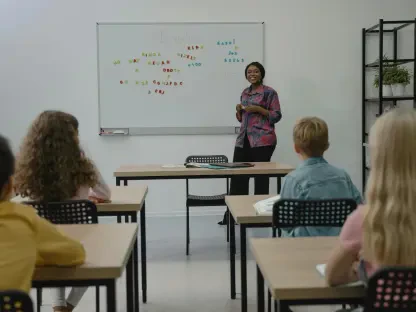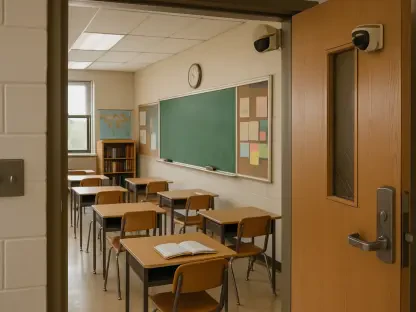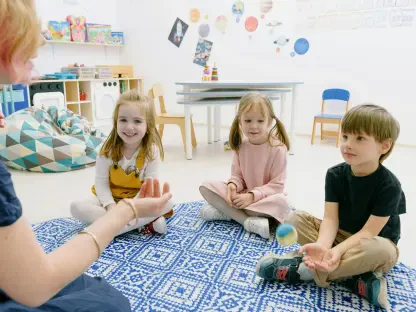The Frost School of Music is revolutionizing the way undergraduate music educators are prepared for their careers. Traditionally, professional conferences and leadership roles in music education have been reserved for seasoned educators and graduate students. However, the Frost School is breaking this norm by involving undergraduates in these high-level professional experiences. This initiative aims to cultivate leadership, advocacy, and community-building skills among students, preparing them to be more than just classroom instructors.
Breaking Traditional Norms
Undergraduate Participation in Professional Conferences
In a bold step, the Frost School of Music had nine undergraduates present at the prestigious Florida Music Educators Association’s (FMEA) annual conference. This opportunity, which is usually reserved for experienced educators, offered these students a unique platform to discuss critical music education topics in front of seasoned professionals. Professor Carlos Abril, who witnessed their presentations, expressed immense pride in the students and noted how the experience significantly boosted their confidence and poise. The success of these undergraduates in such a high-pressure environment underscores the importance of providing them with opportunities to engage at professional levels early in their careers.
The decision to include undergraduates in the FMEA conference is part of a broader initiative at the Frost School to push the boundaries of traditional music education. By exposing young educators to real-world challenges and professional environments, the school is actively preparing them to take on leadership roles in the future. This approach not only benefits the students but also enriches the field of music education by introducing fresh perspectives and innovative teaching methods. The experiences gained at the FMEA conference serve as a testament to the potential and capability of undergraduate students when given the right opportunities and support.
Cultivating Leadership and Advocacy
The Frost School’s initiative is part of a broader effort to incorporate leadership, advocacy, and innovation into the education of undergraduates. By integrating these critical skills into the curriculum, the school aims to prepare students for roles that extend beyond traditional classroom teaching. Events like the FMEA conference serve as practical platforms for students to demonstrate and hone these skills. For example, Professor Stephen Zdzinski led a panel on working with special needs students, which included contributions from five undergraduate students, showcasing the school’s commitment to inclusive education and leadership development.
The emphasis on leadership and advocacy is not limited to conference participation. The Frost School actively encourages students to engage with influential figures in the field of music education. This exposure helps students understand the broader impact they can have on the sector. By meeting and interacting with leaders such as the incoming FMEA board president and the president of the National Association of Music Educators, students gain valuable insights into the importance of advocacy and the roles they can play in shaping the future of music education. This holistic approach ensures that graduates are not just effective teachers but also proactive advocates for the profession.
Expanding Perceptions of Music Education
Exposure to Leadership and Advocacy
Over recent years, the music education department at Frost School of Music has methodically expanded undergraduates’ perceptions of their roles. The school has exposed students to leadership and advocacy through direct interactions with prominent figures in the field. These experiences are designed to help students understand the broader impact they can have on the music education sector. Such interactions include meetings with the incoming FMEA board president and the president of the National Association of Music Educators, providing students with a firsthand look at the workings of influential organizations and the importance of their future roles.
This exposure extends beyond mere observation, as students are encouraged to actively participate in discussions and advocacy efforts. For instance, Professor Carlos Abril involves his undergraduates in broader advocacy initiatives, including those on Capitol Hill advocating for music education. These activities foster a sense of responsibility and empowerment among students, equipping them with the skills needed to advocate for music education policies and resources effectively. By integrating these real-world experiences into the curriculum, the Frost School ensures that its graduates are not only skilled educators but also passionate advocates for the importance of music education in schools and communities.
Practical Applications in the Classroom
Junior student Meli Aguila, one of the panel participants at the FMEA conference, emphasized the importance of authenticity in the classroom. Inspired by her teaching experiences at Frost School, Aguila discussed how being genuine is crucial for gaining students’ respect. This philosophy aligns with the teaching approach promoted by Frost School, which encourages students to be authentic and innovative educators. Aguila’s insights highlight the significance of building trust and respect in the classroom, which are essential components of effective teaching and leadership. Her experience at the FMEA conference has reinforced her belief in the value of authenticity and its impact on student engagement and learning.
The emphasis on practical applications in the classroom is a cornerstone of the Frost School’s approach to music education. Students are encouraged to apply the skills and knowledge they acquire in real-world teaching scenarios, allowing them to develop and refine their techniques. This hands-on approach ensures that graduates are well-prepared to face the challenges of modern music education. By fostering a culture of authenticity and innovation, the Frost School is creating a new generation of music educators who are equipped to inspire and lead their students effectively. The experiences of students like Aguila demonstrate the positive impact of this approach on their professional development and readiness to enter the field.
Innovative Teaching and Research Opportunities
Weekly Forums and Innovative Teaching Ideas
In Professor Carlos Abril’s methods course, students are required to present innovative teaching ideas to their peers and faculty at the program’s weekly Friday forums. These sessions cover a wide range of subjects, from leadership to networking, broadening students’ understanding of their professional roles and responsibilities. Junior student Meli Aguila found these insights particularly invaluable, especially in terms of advocacy, resourcefulness, and community engagement. The weekly forums offer a dynamic environment for students to share and refine their ideas, fostering a collaborative and innovative spirit among future music educators.
These forums also serve as a platform for students to receive constructive feedback from both their peers and faculty, helping them to improve and develop their teaching methods. By presenting their ideas in a supportive yet critical environment, students learn to think critically about their practices and adapt to new challenges. This process of continuous improvement is crucial for their development as educators and leaders. The emphasis on innovation and collaboration in the weekly forums reflects the Frost School’s commitment to preparing students for the evolving landscape of music education, ensuring they are equipped with the skills and confidence needed to succeed in their future careers.
Undergraduate Involvement in Research
Another significant initiative by Professor Abril was involving undergraduates in a research project traditionally reserved for graduate students. Last fall, three undergraduates were hired to work on a project with children in Little Havana. This strategic decision was made to instill a sense of leadership in creating new knowledge through research. Senior Chris Enriques described his first research experience as both fascinating and confidence-boosting. The involvement of undergraduates in such projects underscores the Frost School’s commitment to providing diverse and enriching experiences for its students, preparing them for various aspects of their future careers, including research and innovation.
The research project also provided students with practical experience in conducting research and presenting their findings. For instance, Chris Enriques presented on the topic of teaching bachata at the weekly forum, further reinforcing his newfound sense of leadership. His participation in the research project and subsequent presentations helped him develop a deeper understanding of the importance of innovation and confidence in teaching practices. By involving undergraduates in research, the Frost School is not only broadening their academic horizons but also fostering essential skills such as critical thinking, problem-solving, and effective communication, which are invaluable in their professional lives.
Preventing Teacher Isolation and Burnout
Building Confidence and Creativity
The Frost School’s proactive approach aims to prevent teacher isolation and burnout, phenomena frequently associated with a lack of engagement. By instilling confidence, creativity, and a leadership mindset early on, the school prepares its students for long-lasting and fulfilling careers in music education. Professor Carlos Abril has emphasized that the rapidly evolving educational landscape demands new models and perspectives. He believes the current generation of students has the potential to lead this transformation, provided they are equipped with the necessary skills and opportunities. The school’s initiatives are designed to build a solid foundation for students, ensuring they are well-prepared to navigate the complexities of the education sector.
The emphasis on building confidence and creativity is evident in the various programs and initiatives implemented by the Frost School. From participation in professional conferences to research projects and weekly forums, students are constantly encouraged to think critically and creatively about their roles as educators. These experiences help them develop a sense of self-assurance and innovation that is essential for effective teaching. By fostering an environment that values creativity and encourages exploration, the Frost School is helping to create a new generation of music educators who are not only skilled in their craft but also resilient and adaptable to the challenges they may face in their careers.
Adapting to 21st-Century Practices
The Frost School’s efforts align with the pressing need to adapt 20th-century education models to 21st-century practices. Today’s students must step up with their innovative ideas to drive the field forward. The deliberate efforts by the Frost School are yielding positive results, with students feeling well-prepared and enthusiastic about their future roles as music educators. By integrating modern teaching techniques, technology, and a focus on diversity and inclusion, the school is ensuring that its graduates are equipped to meet the demands of contemporary education. The success of these initiatives indicates a promising shift towards a more innovative and inclusive approach to music education.
The emphasis on 21st-century practices is not merely about incorporating new technology or teaching methods. It also involves a shift in mindset, where educators are seen as leaders and advocates for their students and communities. The Frost School’s comprehensive approach to education emphasizes the importance of adaptability, continuous learning, and a commitment to social justice. By preparing students to be forward-thinking and responsive to the needs of their students, the school is fostering a generation of educators who are capable of making a meaningful impact in their field. These efforts ensure that graduates are not only prepared for the present but are also equipped to shape the future of music education.
A Promising Future for Music Education
The Frost School of Music is transforming how undergraduate music educators get ready for their professional lives. Historically, professional conferences and leadership roles in music education were typically reserved for experienced educators and graduate students. But the Frost School is changing this by involving undergraduates in these high-level professional experiences. This initiative is designed to develop students’ leadership, advocacy, and community-building skills, going beyond traditional classroom instruction. Undergraduates now have the opportunity to present at conferences, participate in workshops, and take on leadership roles normally occupied by those with more experience. These enriching experiences help budding educators build confidence, broaden their professional networks, and gain valuable insights into the music education field. By equipping undergraduates with these advanced skills and experiences early on, the Frost School is setting them up for success, ensuring they are well-prepared to lead and innovate in their future careers as music educators.









